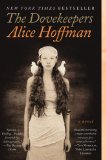Summary | Excerpt | Reading Guide | Reviews | Beyond the Book | Readalikes | Genres & Themes | Author Bio

A Novel
by Alice Hoffman
Determined to get what I wanted, I managed to fill half a jug with silty water, strained first through my fingers, then through the fabric of my blue scarf. When I was done I rose, greedy with thirst. I turned away from the well, then gazed up in alarm. I didn't see the night sky filled with stars, or the fires of Jerusalem, only the other assassin, Ben Simon, who had been watching me. My arms were covered with mud, my tunic cast open. I felt myself flush with heat. I didn't understand why he had appeared out of the dark or why he stayed. He didn't even know my name. I thought he would turn away, but he stared at me for a long time, the way a man looks at a deer to gauge if it's too far away to chase, or just near enough to catch. He nodded, and then I knew. I wasn't invisible after all.
I COUNTED OFF the days in the desert by cutting my leg with a sharpened rock. Our people were not allowed to injure ourselves; that was the practice of pagans and nomads in their time of mourning. Do not cut your bodies to mourn for the dead, nor tattoo any marks on you, the Lord commanded us in the Fourth Book of Moses. But I heard only the voice of the desert, not the words of the Almighty. I hid the cuts beneath my shawl. In the life we led, pain was something to get used to, to inure yourself against. I would rather hurt myself than be hurt by someone else, and so I took up this practice with a sense of purpose and without remorse.
It was the first time I broke our laws. After that, the rest came easily to me.
I was thrown together with Sia and her children when I would have preferred to be alone. Still, she was kind to me and I became accustomed to her. Because she was older and married, I thought she would expect me to be deferential, but instead she considered me a sister, and I grew to enjoy her company. There were days when we laughed and made our rough life into a game, even though the men threw us sullen looks. We worked well together, collecting the few greens we could find, making stews of our dwindling supply of oil and olives, dried figs and lentils. We cooked bread on the hot stones of our fire, covering the loaves with ashes so they might bake. Sometimes the men went off to hunt, bringing back an occasional partridge, which we added to our stews.
I was deeply affected by what a good mother Sia was to her sons, how uncomplaining when they clamored for her attentions. Her boys were little more than babies, and she sang them to sleep every night, determined not to relinquish all of the loving-kindness they'd known in the world we had left behind. Each time she sang I thought of the girl from Alexandria who had cared for me when I had no mother. I often fell asleep beside the children, imagining that Sia's lullabies were meant for me. My new friend had tirelessly combed out the ashes that had fallen into my hair during the burning of Jerusalem. When we found a shallow pool, we rushed into it as soon as we spied the glittering water, able to forget, however briefly, what our circumstances were, splashing each other as if we were indeed sisters.
Secretly, I continued to record my time in the desert by etching each day into my flesh. I kept to myself, but I couldn't help but be aware of Ben Simon, taking note of the scar on his face. Whenever I saw him watching me, I quickly covered my leg. I didn't want him to know who I really was, a neglected, ugly girl with callused hands. And yet something connected us, perhaps because we were both scarred. Clearly he saw me as no one else ever had. I could see his face transform as he stared at me; there was something burning and reckless in his glance. It came to be that the only time I felt alive was when he looked at me. His very presence was like bee stings, riveting my attention. I began to brood over him, wondering how he had been scarred and what dark matters he had attended to in Jerusalem. I had persistent, slow-burning thoughts of him jumbled inside my head, ones that embarrassed me and made me feel that I was a traitor, though I'd done nothing wrong.
Excerpted from The Dovekeepers by Alice Hoffman. Copyright © 2011 by Alice Hoffman. Excerpted by permission of Scribner. All rights reserved. No part of this excerpt may be reproduced or reprinted without permission in writing from the publisher.
Your guide toexceptional books
BookBrowse seeks out and recommends the best in contemporary fiction and nonfiction—books that not only engage and entertain but also deepen our understanding of ourselves and the world around us.